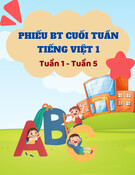
SỞ GD&ĐT THỪA THIÊN HUẾ
TRƯỜNG THPT PHÚ BÀI
ĐỀ CƯƠNG ÔN TẬP CUỐI KÌ II
NĂM HỌC 2020-2021
Môn: Tiếng Anh 10
LANGUAGE
1. PRONUNCIATION
Choose the word which is stressed differently from the rest.
1. A. finger B. consume C. deplete D. protect
2. A. confusion B. solution C. protection D. editor
3. A. animal B. invention C. energy D. influence
4. A. entertainment B. ecological C. economic D. encouragement
5. A. consumption B. pesticide C. destruction D. disposal
6. A. pesticide B. habitat C. important D. digital
2. VOCABULARY
1. This software can be used ……. different kinds of media players
A.to B. at C. with D. for
2. The factory was fined for discharging chemicals into the river. The underlined word has closest meaning
to:
A. charging B. throwing C. in charging D. discounting
3. Water ……. are things like detergents, pesticides ,oils and other chemicals that make the water unclean
and contaminated.
A. pollution B. pollutants C. polluted D. polluting
4. ……….is the removal or cutting down all trees in an area for urban use and farm lands.
A. Greenhouse effect B. Depletion C. Deforestation D. Fossil fuels
5. One of the aims of Greenpeace is to .................... of the environmental problems facing our planet.
A. take responsibility B. arouse interest C. raise concern D. raise awareness
6. London is home to people of many _____ cultures
A. diversification B. diversity C. diversify D. diverse
7. Students can also use word processing …………… to improve their vocabulary.
A. assignments B. applications C. calculations D. Devices
8. There are lots of things we can all do to _____ the environment
A. protect B. enhance C. make D. build
9. On the wedding day, the best man is expected to help the _____
A. groom B. bride C. guest D. bridesmaid
3. GRAMMAR
1. Men and women ………. equal rights to education and employment
A. should be given B. should give C. gave D. give
2. His new digital camera is ………. I have ever seen.
A. more expensive B. the most expensive C. as expensive as D.the expensiver
3. All smartphones………. storage hardware is big can store downloaded audio books
A. which B. who C. whose D. that
4. Someone ………. the tickets are free.
A. said me B. said me that C. told to me D. told me
5. If I were you, I ………. a taxi to the airport.
A. would taken B. will take C. would take D. would be take
6. If we ………. a taxi, you won‟t be late for school

A. took B. take C. taken D. have taken
7. The situation was much .......... than we expected.
A. as bad as B. worse C. more badly D. worst
8. They announced that he .............................. a number of key figures the day before
A. met B. has met C. had met D. meets
9. ____ tablet is perfect for people whose work is to draw and write.
A. The B. An C. Ø D. A
4. READING COMPREHENSION
Read the following passage and choose the correct answer A, B, C or D
In many ways, the increasingly rapid pace of climate change is a direct result of the growth of the
human population. In the last 100 years, the world population has more than tripled. Obviously, this has
meant that the world has needed to produce three times as much food, energy, and other natural resources.
In addition, the average person uses more energy and natural resources than the average person one
hundred years ago, meaning that the rates of consumption are actually much higher than just the increase in
population would imply.
All of these activities: food production, energy usage, and the use of natural resources contribute to climate
change in some way. The greater amounts of oil and other fuels burned to create energy release chemicals
which add to global warming. In order to produce more food, farmers cut down trees to gain more land for
their fields. In addition, we cut down trees to build the houses needed for a larger population. Those trees are
an essential part of controlling global warming.
In addition to a growing population, the world also has a population that desires a higher standard of
living than in the past, and a higher standard of living requires the use of even more natural resources. For
example, China is the world‟s most populous nation, with 1.3 billion people. Currently, the standard of
living for most of those people is far below that of people in first world nations. Therefore, the average
Chinese citizen uses far fewer natural resources and less energy than the average citizen of the US or Japan.
If every Chinese person attains a first world lifestyle, the amount of energy and natural resources needed in
the world will double, even if the standard of living in every other nation on Earth remains the same as it is
today.
1. The growth of the human population results in ………….
A. climate change rapidly B. lack of food C. shortage of natural resources D. lack of
energy
2. The word “consumption” in the passage is closest in meaning to _____.
A. development B. usage C. population D. increase
3. According to the passage, how does the standard of living affect global warming?
A. Higher standards of living are better for the environment.
B. First world nations create less population than developing nations.
C. The use of natural resources is directly related to the standard of living.
D. High standards of living lead to increases in world population.
4. Why does the author discuss China, Japan and the United States?
A. To compare the standards of their citizens.
B. To explain why China will not be able to become a first world nation.
C. To explain why the world‟s use of energy will need to double soon.
D. To better illustrate the effects of an increase in standards of living.
The last two decades have seen enormous changes in the way people's lives are affected by IT.
Twenty years ago, few people had access to a computer while today most people use them at work, home or
school and use of e-mail and the Internet is an every day event.

These developments have brought many benefits to our lives. E-mail makes communication much easier
and more immediate. This has numerous benefits for business, commerce, and education. The World Wide
Web means that information on every conceivable subject is now available to us. Clearly, for many people
this has made life much easier and more convenient.
However, not all the effects of the new technology have been beneficial. Many people feel that the
widespread use of e-mail is destroying traditional forms of communication such as letter writing, telephone
and face-to-face conversation. In addition, the huge size of the Web means it is almost impossible to control
and regulate. This has led to many concerns regarding children accessing unsuitable websites. In conclusion,
developments in IT have brought many benefits, yet I believe developments relating to new technology in
the future are likely to produce many negative effects that will need to be addressed very carefully.
1. According to the passage, E-mail________________________.
A. reduces face-to-face contact B. can be checked quickly and easily
C. is used only in business D. takes a lot of time to transmit
2. What does the IT stand for?
A. Information Transfer B. Information Transmission
C. Information Theory D. Information Technology
3. The World Wide Web and e-mail communication________________________.
A. causes a busy and exciting life B. have also been used for education purpose
C. is difficult to get access to D. is destroying traditional customs
4. The writer thinks future IT developments will be________________________.
A. more positive B. more negative C. more rapid D. unexpected
BODY LANGUAGE AND CULTURAL DIFFERENCES
The body language people use often communicates more about their feelings than the words they are
saying. We use body movements, hand gestures, facial expressions, and changes in our voice to
communicate with each other. Although some body language is universal, many gestures are culturally
specific and may mean different things in different countries.
If you want to give someone the nod in Bulgaria, you have to nod your head to say no and shake it to
say yes – the exact opposite of what we do! In Belgium, pointing with your index finger or snapping your
fingers at someone is very rude.
In France, you shouldn‟t rest your feet on tables or chairs. Speaking to someone with your hands in
your pockets will only make matters worse. In the Middle East, you should never show the soles of your
feet or shoes to others as it will be seen as a grave insult. When eating, only use your right hand because
they use their left hands when going to the bathroom.
In Bangladesh, the „thumbs-up‟ is a rude sign. In Myanmar, people greet each other by clapping, and
in India, whistling in public is considered rude.
In Japan, you should not blow your nose in public, but you can burp at the end of a meal to show that
you have enjoyed it. The „OK‟ sign (thumb and index finger forming a circle) means „everything is good‟ in
the West, but in China it means nothing or zero. In Japan, it means money, and in the Middle East, it is a
rude gesture.
1: It is mentioned in the passage that many gestures __________.
A. may mean different things in different countries.
B. are not used to communicate our feelings.
C. can be used to greet each other in public.
D. are used in greeting among men and women.
2: In the Middle East, people do not use their left hands for eating because they use their left
hands________.
A. when going to the bathroom. B. when preparing the meal.
C. to put in their pockets. D. to clean their tables and chairs.

3: Which of the following is NOT true according to the passage?
A. In France, people shouldn‟t rest their feet on tables.
B. In Belgium, snapping your fingers at someone is very rude.
C. In China, the „OK‟ sign means money
D. In Myanmar, people greet each other by clapping
4: The word “others” in paragraph 3 refers to __________.
A. other people. B. other shoes C. other soles D. other feet
4. WRITING
Choose the letter A, B, C or D to indicate the underlined part that needs correction (0,5 point).
1.She‟s the woman whom sister looks after the baby for us.
A. the B. whom C. after D. us
2. He said that he visisted Thailand the year before.
A. said B. visited C. the D. Before
3. What is the name of the girl which we met at the party last night ?
A. is B. the girl C. which D. th
4. Rosy said that she will come back there on another project the following year.
A. said B. will come back C. there D. the following
5. Most of the guests turned up two hours early, that took us by surprise.
A. Most B. turned up C. that D. by surprise
6. They asked the children to not make too much noise.
A. asked B to not C. too D. much
Theme Writing
1. Write a paragraph (about 120-140 words) about environmental problems and give some practical advice
on how to preserve the environment.
Suggested ideas
* Introducing the type of pollution
- fossil fuels, non-renewable resources: coal, oil ….
- air pollution
* Giving some practical advice on how to preserve the environment.
- reducing the use of fossil fuels for energy
- research and replace fossil fuel energy with other renewablefuels such as water, sun …
- raise awareness on the problems in the public and in education
2. Write a paragraph of 120 - 140 words about air pollution, using suggested writing frame below.
- Causes of air pollution
- Its consequences
- What should be done




![Bài tập so sánh hơn và so sánh nhất của tính từ [kèm đáp án/mới nhất]](https://cdn.tailieu.vn/images/document/thumbnail/2025/20250808/nhatlinhluong27@gmail.com/135x160/77671754900604.jpg)
![Tài liệu tham khảo Tiếng Anh lớp 8 [mới nhất/hay nhất/chuẩn nhất]](https://cdn.tailieu.vn/images/document/thumbnail/2025/20250806/anhvan.knndl.htc@gmail.com/135x160/54311754535084.jpg)




![Tài liệu Lý thuyết và Bài tập Tiếng Anh lớp 6 [Mới nhất]](https://cdn.tailieu.vn/images/document/thumbnail/2025/20250802/hoihoangdang@gmail.com/135x160/18041754292798.jpg)





